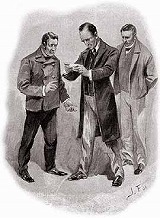
“Very good, Lestrade,” said Holmes, laughing. “You really are very fine indeed. Let me see it.” He took up the paper in a listless way, but his attention instantly became riveted, and he gave a little cry of satisfaction. “This is indeed important,” said he.
“Ha! you find it so?”
“Extremely so. I congratulate you warmly.”
Lestrade rose in his triumph and bent his head to look. “Why,” he shrieked, “you’re looking at the wrong side!”
“On the contrary, this is the right side.”
“The right side? You’re mad! Here is the note written in pencil over here.”
“And over here is what appears to be the fragment of a hotel bill, which interests me deeply.”
“There’s nothing in it. I looked at it before,” said Lestrade.
“Oct. 4th, rooms 8s., breakfast 2s. 6d., cocktail 1s., lunch 2s. 6d., glass sherry, 8d.
I see nothing in that.”
“Very likely not. It is most important, all the same. As to the note, it is important also, or at least the initials are, so I congratulate you again.”
“I’ve wasted time enough,” said Lestrade, rising. “I believe in hard work and not in sitting by the fire spinning fine theories. Good-day, Mr. Holmes, and we shall see which gets to the bottom of the matter first.” He gathered up the garments, thrust them into the bag, and made for the door.
“Just one hint to you, Lestrade,” drawled Holmes before his rival vanished; “I will tell you the true solution of the matter. Lady St. Simon is a myth. There is not, and there never has been, any such person.”
Lestrade looked sadly at my companion. Then he turned to me, tapped his forehead three times, shook his head solemnly, and hurried away.
He had hardly shut the door behind him when Holmes rose to put on his overcoat. “There is something in what the fellow says about outdoor work,” he remarked, “so I think, Watson, that I must leave you to your papers for a little.”
It was after five o’clock when Sherlock Holmes left me, but I had no time to be lonely, for within an hour there arrived a confectioner’s man with a very large flat box. This he unpacked with the help of a youth whom he had brought with him, and presently, to my very great astonishment, a quite epicurean little cold supper began to be laid out upon our humble lodging-house mahogany. There were a couple of brace of cold woodcock, a pheasant, a pâte de foie gras pie with a group of ancient and cobwebby bottles. Having laid out all these luxuries, my two visitors vanished away, like the genii of the Arabian Nights, with no explanation save that the things had been paid for and were ordered to this address.
Just before nine o’clock Sherlock Holmes stepped briskly into the room. His features were gravely set, but there was a light in his eye which made me think that he had not been disappointed in his conclusions.
“They have laid the supper, then,” he said, rubbing his hands.
“You seem to expect company. They have laid for five.”
“Yes, I fancy we may have some company dropping in,” said he. “I am surprised that Lord St. Simon has not already arrived. Ha! I fancy that I hear his step now upon the stairs.”
It was indeed our visitor of the afternoon who came bustling in, dangling his glasses more vigorously than ever, and with a very perturbed expression upon his aristocratic features.
“My messenger reached you, then?” asked Holmes.
“Yes, and I confess that the contents startled me beyond measure. Have you good authority for what you say?”
“The best possible.”
Lord St. Simon sank into a chair and passed his hand over his forehead.
“What will the Duke say,” he murmured, “when he hears that one of the family has been subjected to such humiliation?”